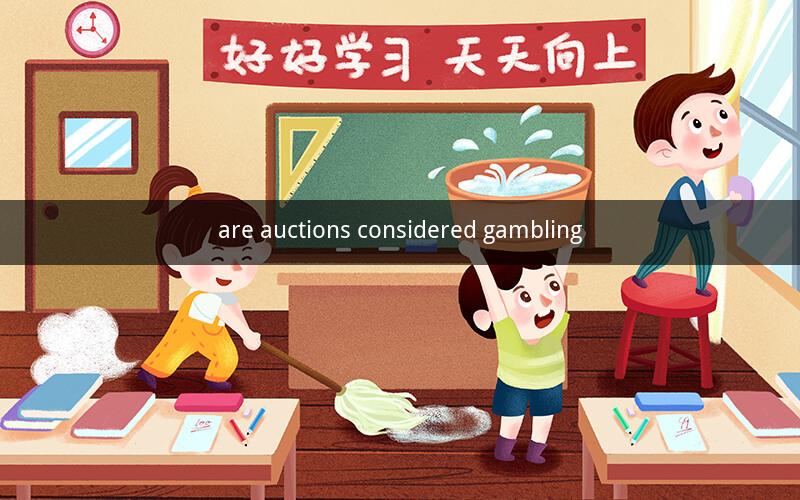
Are Auctions Considered Gambling?
Table of Contents
1. Understanding Auctions
2. The Nature of Gambling
3. Legal Perspectives on Auctions and Gambling
4. Differences in Participation and Outcome
5. The Role of Chance in Auctions
6. The Psychological Aspect of Bidding
7. Ethical Considerations
8. Conclusion
1. Understanding Auctions
Auctions are a method of selling goods or services where the highest bidder wins. They have been used for centuries and are prevalent in various industries, including art, real estate, and antiques. The process involves a seller setting a starting price and potential buyers offering increasingly higher amounts until no one is willing to bid further.
2. The Nature of Gambling
Gambling, on the other hand, is defined as betting money or something of value on an event with an uncertain outcome, with the primary intent of winning additional money or material goods. It typically involves a degree of chance, and the outcome is not predetermined.
3. Legal Perspectives on Auctions and Gambling
The legal distinction between auctions and gambling can be complex. In many jurisdictions, the key factor is whether the outcome of the auction is determined by chance or skill. If the outcome is based on chance, it may be considered gambling. However, if the outcome is based on the bidder's knowledge, expertise, or negotiation skills, it is more likely to be classified as an auction.
4. Differences in Participation and Outcome
Auctions and gambling differ in terms of participation and outcome. In an auction, participants have the opportunity to inspect the item, research its value, and make an informed decision. The outcome is based on the highest bid, which is influenced by the item's value, the competition among bidders, and the bidder's strategy.
In gambling, participants typically have limited or no information about the outcome of the event they are betting on. The outcome is based on chance, and participants are often unaware of the true value of the item or service they are betting on.
5. The Role of Chance in Auctions
While chance plays a role in auctions, it is not the primary factor. Bidders may rely on their knowledge of the item, market trends, and their ability to predict future value. In some cases, the item's value may be unpredictable, leading to a higher degree of chance. However, the bidder's decision-making process is still a significant factor in determining the outcome.
6. The Psychological Aspect of Bidding
The psychological aspect of bidding in an auction can be similar to that of gambling. Bidders may experience the thrill of competing against others, the fear of losing out on a valuable item, and the desire to win. This can lead to irrational behavior, such as overbidding or chasing the competition.
7. Ethical Considerations
Ethical considerations also play a role in the distinction between auctions and gambling. Auctions are often conducted with transparency and fairness, ensuring that all participants have an equal opportunity to bid. In contrast, gambling can be associated with unethical practices, such as cheating or fraud.
8. Conclusion
While there may be some overlap between auctions and gambling, the primary difference lies in the nature of the outcome and the role of chance. Auctions are generally considered a legitimate method of selling goods or services, while gambling is often viewed as a form of entertainment or risk-taking.
Questions and Answers
1. What is the main difference between an auction and gambling?
- The main difference is that an auction's outcome is based on the highest bid, influenced by the item's value and the bidder's strategy, while gambling's outcome is based on chance.
2. Can an auction be considered gambling if the outcome is determined by chance?
- Yes, if the outcome of an auction is determined by chance, it may be considered gambling, depending on the jurisdiction and the specific circumstances.
3. Are all types of auctions considered gambling?
- No, not all types of auctions are considered gambling. The distinction depends on the nature of the outcome and the role of chance.
4. Can a person win money in an auction?
- Yes, a person can win money in an auction if they bid the highest amount and the seller accepts their offer.
5. Are online auctions considered gambling?
- Online auctions can be considered gambling if the outcome is determined by chance, but they are often viewed as legitimate methods of selling goods or services.
6. Can a person lose money in a gambling auction?
- Yes, a person can lose money in a gambling auction if they bid more than the item's value or if the outcome is determined by chance.
7. Are there any legal risks associated with participating in a gambling auction?
- Yes, there may be legal risks associated with participating in a gambling auction, depending on the jurisdiction and the specific circumstances.
8. Can a person use their expertise to win an auction?
- Yes, a person can use their expertise to win an auction by making informed decisions based on their knowledge of the item and the market.
9. Are there any ethical concerns associated with gambling auctions?
- Yes, there may be ethical concerns associated with gambling auctions, such as the potential for fraud or unfair practices.
10. Can a person become addicted to bidding in an auction?
- Yes, a person can become addicted to bidding in an auction, similar to other forms of gambling. This can lead to financial and personal problems.